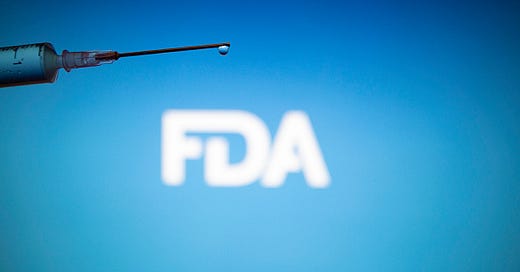On Monday, the Food and Drug Administration finally offered its full approval for the first COVID-19 vaccine. The Pfizer-BioNTech vaccine was fully approved for people aged 16 and older. Moderna’s approval is likely to follow soon.
Before we cut any deeper, I want to step back and appreciate how big of a deal this is. In less than two years, we went from the first reports of a flu-like illness in Wuhan, China to a fully approved vaccine against that virus. No doubt, this has been a deeply polarizing moment in American society. So much of the vitriol has focused on the government. But folks: this is your government working! Government supported the basic research that allowed us to weaponize mRNA against the virus. Government supported the production of these vaccines in record time. Government deployed those vaccines into millions of arms. Government worked.
There are, of course, those who are asking what took so long. Hundreds of millions of Americans — billions around the world — have already received at least one dose of the vaccine. Beyond scouring a few controlled studies, reams and reams of data about use in the real world have already shown their safety and efficacy. Nevertheless, there’s value in dotting i’s and crossing t’s. And that’s why this full FDA approval is so important. Now let’s talk about what full approval will and won’t do.
Some believe that full approval will massively increase vaccination rates on its own — that the unvaccinated have simply been waiting on the FDA. I’m less sure about that. Though the previous lack of full approval has been trotted out by vaccine resistors as a reason not to vaccinate, it’s usually used as a defensive shield rather than an actual logical consideration. Sure, the FDA’s action on Monday will take away that shield—so they’ll probably just change it out: indeed, some of the most ardent opponents of vaccines are already changing their tune, arguing now that the FDA’s full approval simply can’t be trusted. As I’ve written in these pages, it was never about logic, after all. For others for whom vaccination remains inconvenient, the approval changes nothing about the calculus of time, resources, and energy that stands in the way. But, there is some small proportion of unvaccinated for whom we can hope this full approval may, in fact, tip the scales toward finally getting vaccinated.
There’s a more powerful, if indirect, way that full FDA approval may increase vaccination rates. It opens the door to vaccine requirements by employers. Though, prior to full FDA approval, Equal Employment Opportunity Commission guidance clearly allows for vaccine requirements, many employers have stopped short of calling for them awaiting full approval. For example, Delta Air Lines announced that it would not require vaccination without full FDA approval. Like unvaccinated individuals, however, it’s impossible to know whether employers are being fully honest about waiting for full FDA approval, or simply using it as a shield to avoid taking a step that they perceive could be unpopular with employees and customers.
And then there’s the power of advertising. As much as I detest pharmaceutical advertising, it is exceedingly powerful in shaping public perceptions. That’s exactly why pharmaceutical corporations spend billions of dollars on it. But they can only advertise drugs that have gotten full FDA approval — which is why you haven’t seen any ads for COVID-19 vaccines paid for by their manufacturers. Full approval changes that. As they see it, nearly half of their potential patient base isn’t consuming their product, and they’re going to use every tool in their arsenal to change that. There’s also implicit competition here. Each of the manufacturers wants unvaccinated people to choose their brand, ratcheting up the incentive to advertise for a greater proportion of the market share. That all accrues to society’s benefit because, of course, it doesn’t much matter which vaccine people take as long as they take one.
That said, rather than advertise to the unvaccinated, corporations may choose instead to advertise the third dose booster to the vaccinated who, by definition, are less resistant to the vaccine. Which reminds us that we should never count on pharmaceutical corporations to do the right thing, only the lucrative thing — which, in this case, may be one and the same.
All told, full FDA approval is a critical weapon in the fight against COVID-19. Now it’s time for employers, manufacturers, and the rest of the government to pick it up.





We so appreciate your expertise. Thank you for your service!
Economics will be a huge issue.